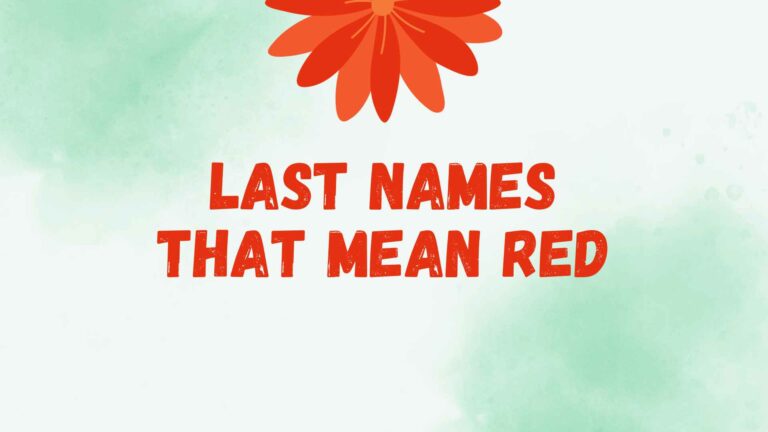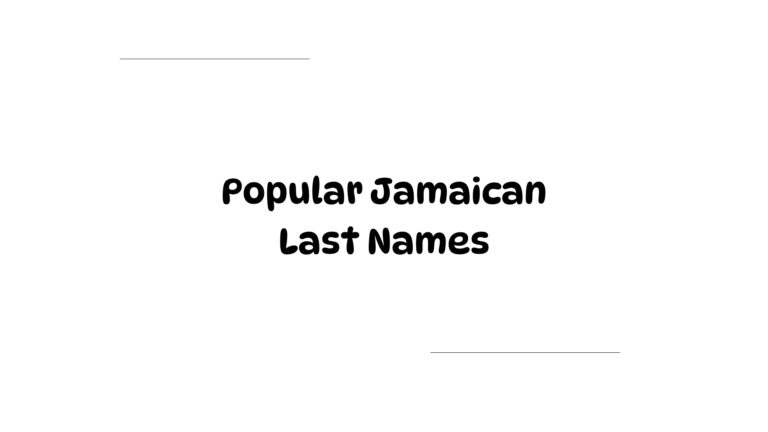100 Cool Royal Last Names
Royal family names have long been the source of fascination because they connote power, blood, and historical continuity.
Many royals generally only prefer to be called by their first names and titles; and, after some time, some of them adopted or were even given surnames.
From the House of Windsor of Britain to the Habsburgs of Austria and the Romanovs of Russia, these names tell a story of dynasties, alliances, and political shifts.
In this article, we will explore the history, meaning, and evolution of royal last names and how they are used to mold the legacy of monarchies worldwide.
Royal last names
Windsor (UK) – Derived from Windsor Castle, symbolizing strength and endurance.
Stuart (Scotland/UK) – From the Old French estuart, meaning “steward” or “guardian.”
Tudor (Wales/England) – Possibly from the Welsh Tudur, meaning “ruler” or “leader.”
Plantagenet (England) – From the Latin Planta Genista, referring to a broom plant used as an emblem.
Habsburg (Austria/Holy Roman Empire) – Named after Habsburg Castle in present-day Switzerland.
Bourbon (France/Spain/Italy) – From Bourbon-l’Archambault in France, associated with a noble lineage.
Valois (France) – Named after the Valois region in northern France.
Capet (France) – From Hugh Capet, founder of the Capetian dynasty, meaning “cape” or “hood.”
Bonaparte (France) – Italian origin, meaning “good departure” or “good fate.”
Orléans (France) – Named after the city of Orléans, denoting a branch of the French royal family.
Savoy (Italy) – From the historical Savoy region, meaning “fir forest” in Latin.
Hohenzollern (Germany/Prussia) – Named after Zollern Castle in present-day Baden-Württemberg.
Wettin (Germany) – From Wettin Castle in Saxony, associated with many German rulers.
Hesse (Germany) – Named after the region of Hesse, derived from the Germanic tribe Chatti.
Oldenburg (Denmark/Norway/Germany) – From the town of Oldenburg, meaning “old fortress.”
Glücksburg (Denmark/Norway/Germany/Greece) – From Glücksburg Castle, meaning “happiness fortress.”
Romanov (Russia) – Meaning “son of Roman,” referring to the dynasty’s founder.
Rurik (Russia) – From Rurik, a Viking prince whose name means “famous ruler.”
Godunov (Russia) – Derived from “godun,” meaning “brawny” or “strong.”
Vasa (Sweden/Poland) – From the Swedish word for “sheaf,” representing agriculture and unity.
Bernadotte (Sweden) – From a French surname meaning “bold bear.”
Battenberg (Germany/UK) – From Battenberg town in Hesse, later changed to Mountbatten in the UK.
Orange-Nassau (Netherlands) – From the House of Nassau and the Principality of Orange in France.
Braganza (Portugal/Brazil) – From the town of Bragança, meaning “noble” or “defensive castle.”
Aviz (Portugal) – Named after the Order of Aviz, a military-religious order.
Saxe-Coburg and Gotha (Germany/UK/Bulgaria/Belgium) – Named after the duchies of Saxe-Coburg and Gotha.
Hohenberg (Austria) – Meaning “high mountain,” used by descendants of Archduke Franz Ferdinand.
Pahlavi (Iran) – Derived from Middle Persian, meaning “heroic” or “warrior.”
Qajar (Iran) – From a Turkic origin, referring to the ruling tribe.
Alaouite (Morocco) – From “Ali,” the dynasty’s founder, meaning “high” or “exalted.”
Saud (Saudi Arabia) – From King Saud, meaning “fortunate” or “blessed” in Arabic.
Osman (Ottoman Empire/Turkey) – From Osman I, meaning “bone” or “pure.”
Seljuk (Turkey/Persia) – Named after the founder Seljuk, meaning “little sultan.”
Ming (China) – Meaning “bright” or “enlightened.”
Qing (China) – Meaning “pure” or “clear.”
Zhao (China, Song Dynasty) – An ancient noble surname meaning “surpass” or “excel.”
Nguyễn (Vietnam) – Meaning “original” or “first,” associated with Vietnamese emperors.
Trần (Vietnam) – Meaning “to exhibit” or “to display,” used by the Trần dynasty.
Lý (Vietnam/Korea) – Meaning “plum,” used by ruling families in both countries.
Gojoseon (Korea, legendary) – Named after the first Korean kingdom, meaning “high morning land.”
Yi (Korea, Joseon Dynasty) – Meaning “plum” or “benefit.”
Ashikaga (Japan) – Named after a region in Japan, meaning “reed hill.”
Tokugawa (Japan) – Meaning “virtuous river,” associated with the shogunate.
Meiji (Japan, Imperial Family) – Meaning “enlightened rule.”
Chakri (Thailand) – Meaning “mighty warrior” or “wheel of power.”
Gupta (India, ancient dynasty) – Meaning “protector” or “guardian.”
Maurya (India, ancient dynasty) – Meaning “peacock” or derived from the name of a warrior tribe.
Rajput (India, multiple dynasties) – Meaning “son of a king” or “royal descendant.”
Shah (Persia/India/Afghanistan) – Meaning “king” in Persian.
Zulu (South Africa) – Meaning “heaven” or “sky,” used by the Zulu royal family.
Anjou (France) – Named after the French region of Anjou, meaning “angel” or “messenger.”
Navarre (Spain/France) – Derived from the Kingdom of Navarre, possibly meaning “new land” or “plains.”
Castile (Spain) – From the Spanish Castilla, meaning “land of castles.”
Aragon (Spain) – Named after the Kingdom of Aragon, possibly meaning “high valley.”
Trastámara (Spain) – Derived from Latin, meaning “across the river.”
Hohenstaufen (Germany/Holy Roman Empire) – Meaning “high Staufen,” referring to a Swabian castle.
Ascania (Germany/Italy) – Named after the Castle of Ascania, meaning “fortified place.”
Lotharingia (France/Germany) – From Lothar, meaning “famous warrior.”
Normandy (France/England) – Derived from Northmen, referring to Viking settlers.
Burgundy (France/Holy Roman Empire) – Named after the Burgundians, meaning “high land.”
Salian (Holy Roman Empire) – Possibly from Latin sal, meaning “salt,” linked to trade.
Supplinburg (Germany) – Named after the House of Supplinburg, meaning “spring fortress.”
Zähringen (Germany) – From Zähringen Castle, meaning “fortified settlement.”
Schleswig-Holstein (Denmark/Germany) – Named after two regions in northern Europe.
Brandenburg (Germany/Prussia) – Meaning “burnt fortress” or “defensive stronghold.”
Hanover (Germany/UK) – From the city of Hanover, meaning “high bank.”
Lippe (Germany) – Named after the Lippe River, meaning “to flow.”
Mecklenburg (Germany) – Meaning “great castle” in Slavic-Germanic origin.
Courtenay (France) – From the Latin curtenus, meaning “enclosed place” or “court.”
Bagrationi (Georgia) – Meaning “descendant of Bagrat,” an ancient Armenian name.
Komnenos (Byzantine Empire) – Meaning “ruler” or “strategist” in Greek.
Palaiologos (Byzantine Empire) – Meaning “old word” or “ancient logic” in Greek.
Lascaris (Byzantine Empire) – Possibly from a Persian origin, meaning “royal guard.”
Doukas (Byzantine Empire) – Meaning “leader” or “general” in Greek.
Sassanid (Persia/Iran) – Named after Sasan, meaning “guardian” or “protector.”
Timur (Timurid Empire) – Meaning “iron” in Turkic, symbolizing strength.
Mughal (India/Persia) – Derived from Mongol, meaning “strong” or “mighty.”
Chola (India) – A Tamil dynasty name, possibly meaning “prosperity” or “sun.”
Pallava (India) – Meaning “new bud” or “sprout” in Sanskrit.
Varman (India/Cambodia) – Meaning “protector” or “shield” in Sanskrit.
Sen (Bengal) – Meaning “army chief” or “commander” in Sanskrit.
Harsha (India) – Meaning “joy” or “happiness” in Sanskrit.
Medici (Italy) – Meaning “doctor” or “healer” in Italian.
Visconti (Italy) – Meaning “deputy” or “vice count” in Latin.
Gonzaga (Italy) – From a place name, possibly meaning “warrior” or “defender.”
Este (Italy) – Named after the town of Este, meaning “eastern settlement.”
Sforza (Italy) – Meaning “force” or “strength” in Italian.
Orsini (Italy) – Derived from orso, meaning “bear,” symbolizing bravery.
Colonna (Italy) – Meaning “column” or “pillar,” signifying strength.
Dragas (Serbia/Bulgaria) – Meaning “precious” or “beloved” in Slavic languages.
Obrenović (Serbia) – Meaning “blessed” or “protector” in Serbian.
Karadjordjević (Serbia) – Meaning “Black George,” a reference to a famous Serbian leader.
Branicki (Poland/Lithuania) – Meaning “ruler” or “noble” in Polish.
Radziwiłł (Poland/Lithuania) – Of Lithuanian origin, meaning “keeper of power.”
Genghis (Mongolia) – Meaning “universal ruler” or “oceanic” in Mongolian.
Borjigin (Mongolia) – Meaning “blue-gray” or “celestial” in Mongolian.
Oyo (Nigeria/West Africa) – Named after the Oyo Empire, meaning “great warrior.”
Benin (Nigeria/West Africa) – Derived from the Benin Empire, meaning “shining” or “brilliant.”
Akan (Ghana/West Africa) – Named after the Akan people, meaning “foremost” or “firstborn.”
Solomonic (Ethiopia) – Named after King Solomon, meaning “peaceful” or “wise.”







